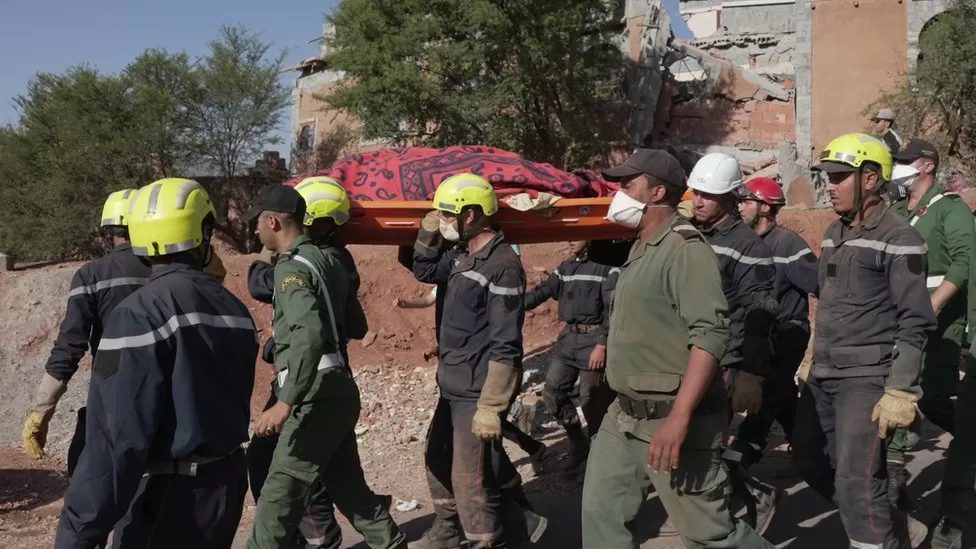Morocco's Response To Earthquake Aid Baffles Foreign Governments
The quake has claimed over 2,500 lives, injured thousands, and displaced many more. However, Morocco's response to earthquake aid baffles foreign government.
Author:Suleman ShahReviewer:Han JuSep 13, 20233.4K Shares433.4K Views

Governments from around the world have extended offers of assistance to Morocco in the aftermath of a devastating 6.8-magnitude earthquake.
The quake has claimed over 2,500 lives, injured thousands, and displaced many more. However, Morocco's response to earthquake aid baffles foreign governments.
The Quest For The Missing
Amid the wreckage, the community's focus narrows down to two missing women: Fatima and Hajar. These two individuals lived on the ground floor of a three-story building located at the heart of the village.
However, the building now precariously tilts to one side, surrounded by heaps of debris—small remnants of lives now forever altered.
The remnants tell a poignant story—a teapot, a child's Disney rucksack, a floral scarf—all bearing witness to the lives once lived here.
Crowds gather around the precarious building, offering prayersfor a glimmer of hope as rescue workers employ sniffer dogs in a desperate quest to detect signs of life.
The determination of the residents is unwavering. They declare that they will not abandon their vigil until Fatima and Hajar are found, regardless of whether they are discovered alive or not.
The sense of unity and kinship within the community is palpable as one resident reflects, "In our culture, we eat from the same plate. We share food and we share plates. We're a family."
Glimmers Of Hope Fade
As hours turn into a day, the hope of finding the missing woman alive grows dimmer. In the late afternoon, a heartbreaking discovery is made—a body is found amidst the rubble.
Rescue workers, moving with the utmost care, gently extract the body and place it on an orange stretcher, shrouding it with blankets. It is Hajar.
The somber procession to the cemetery commences, with the community following in a mournful procession. After the burial, the hearts of the residents weigh heavy with grief, but their determination to locate Fatima remains resolute.
The search for Fatima carries on through the night. Blankets are handed to the search teams as nightfall descends, and the newscirculates quietly among the crowd that Fatima's body has also been found.
As the Muslim call to prayer echoes through the mountains, the stretcher bearing Fatima moves forward solemnly. Khadija, Fatima's sister-in-law, grieves with the support of family members.
As the burial concludes, the residents return to their makeshift tents, and those who had journeyed from afar to offer assistance depart.
The village streets fall silent, but questions linger about how Ouirgane and other affected communities can rebuild their lives.
Delays In Accepting Humanitarian Assistance
Countries such as France, Germany, Italy, the United States, and the United Nations have expressed their willingness to provide aid to Morocco. Yet, Morocco's response has been notably slow.
The Moroccan Interior Ministry initially agreed to accept search-and-rescue teams only from select "friendly countries" like Britain, Qatar, Spain, and the United Arab Emirates.
Despite offers of broader humanitarian and technical assistance, Morocco appeared hesitant to accept them. U.S. Secretary of State Antony Blinken reached out to offer assistance immediately, but Washington awaited a response from Morocco.
Similarly, the United Nations had experts on standby but was waiting for a formal request from Morocco.
France, a former colonial power in Morocco, expressed surprise at Morocco's hesitation to accept assistance. French Foreign Minister Catherine Colonna noted that around 60 countries, including France, had offered aid.
She emphasized that while France had not been refused, they were prepared to support Morocco with both financial and non-profit assistance.
While some countries like the United Kingdom sent search-and-rescue teams, otherslike Germany's Technical Relief Agency faced delays and returned home.
Germany's offer of assistance was acknowledged, but the decision-making process in Morocco seemed to be slow and bureaucratic.
Morocco's reluctance to accept a broad range of aid could be due to concerns about scrutiny and control over the narrative regarding earthquake-affected communities.
An influx of foreign aid workers might shed light on critical issues within these communities.
In any case, accepting foreign assistance would require approval from the highest levels of government, creating potential delays in a complex chain of command.
Final Words
Morocco's cautious approach to accepting international aid in the wake of a devastating earthquake has left foreign governments bewildered.
Despite offers of assistance from numerous countries, Morocco's response has been measured, prompting questions about the reasons behind this reluctance and the impact on affected communities.

Suleman Shah
Author
Suleman Shah is a researcher and freelance writer. As a researcher, he has worked with MNS University of Agriculture, Multan (Pakistan) and Texas A & M University (USA). He regularly writes science articles and blogs for science news website immersse.com and open access publishers OA Publishing London and Scientific Times. He loves to keep himself updated on scientific developments and convert these developments into everyday language to update the readers about the developments in the scientific era. His primary research focus is Plant sciences, and he contributed to this field by publishing his research in scientific journals and presenting his work at many Conferences.
Shah graduated from the University of Agriculture Faisalabad (Pakistan) and started his professional carrier with Jaffer Agro Services and later with the Agriculture Department of the Government of Pakistan. His research interest compelled and attracted him to proceed with his carrier in Plant sciences research. So, he started his Ph.D. in Soil Science at MNS University of Agriculture Multan (Pakistan). Later, he started working as a visiting scholar with Texas A&M University (USA).
Shah’s experience with big Open Excess publishers like Springers, Frontiers, MDPI, etc., testified to his belief in Open Access as a barrier-removing mechanism between researchers and the readers of their research. Shah believes that Open Access is revolutionizing the publication process and benefitting research in all fields.

Han Ju
Reviewer
Hello! I'm Han Ju, the heart behind World Wide Journals. My life is a unique tapestry woven from the threads of news, spirituality, and science, enriched by melodies from my guitar. Raised amidst tales of the ancient and the arcane, I developed a keen eye for the stories that truly matter. Through my work, I seek to bridge the seen with the unseen, marrying the rigor of science with the depth of spirituality.
Each article at World Wide Journals is a piece of this ongoing quest, blending analysis with personal reflection. Whether exploring quantum frontiers or strumming chords under the stars, my aim is to inspire and provoke thought, inviting you into a world where every discovery is a note in the grand symphony of existence.
Welcome aboard this journey of insight and exploration, where curiosity leads and music guides.
Latest Articles
Popular Articles
